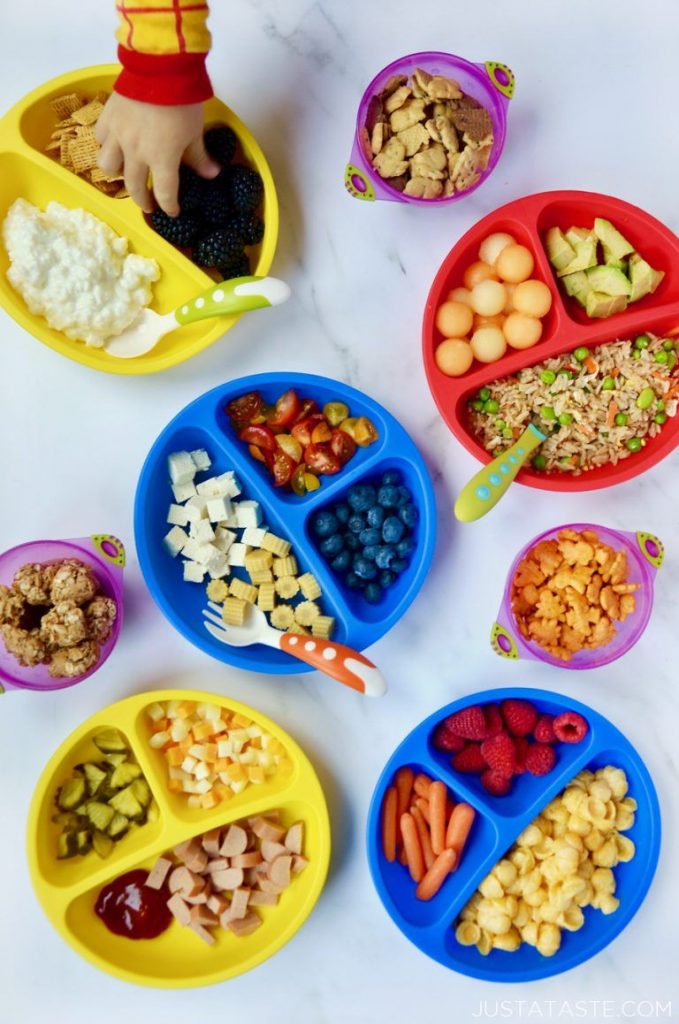What is fussy eating?

Fussy eating is actually a normal part of toddler development. It is an “umbrella term” for a broad range of eating characteristics.
From the age of 18 months, fussy eating can appear and common food traits include:
- Food selectivity – they avoid certain foods or food groups
- Sensory reasons – they avoid a food based on how it looks/smells/feels. They often like food to be presented in a specific way
- Lack of interest or fear in eating – they eat small amounts, they are not interested in food, they eat very slowly or are actually fearful of the food
- Want food separate on the plate – research has shown that this is actually a normal part of being a kid! And not something to worry about
Aside from medical issues that can cause feeding issues, fussy eating may result when babies and young children are not given the opportunity to regularly get messy with food – touching, tasting and smelling a variety of foods and textures. Often, when we as parents get stressed about our child’s food intake, it actually makes the situation worse.
The mum guilt
It is incredibly stressful as a parent to have a fussy eater and have battles every mealtime. As a mum it makes you feel overwhelmed, confused, frustrated and often crushes our confidence. Many mums I work with also feel huge “mum guilt” and worry about their child not eating well enough. They worry that their child won’t be getting everything they need to thrive. The good news is that often fussy eaters still grow to their full potential because they often eat good amounts of carbs and dairy ie. “the white foods”. The main issue here is that they sometimes lack some of the nutrients they need such as iron, zinc and other vitamins.
Do they grow out of it?
Fussy eating is something that can certainly be improved or “fixed” over time, but it most definitely is a journey or “work in progress” rather than a quick fix.
Competent eaters take years to develop and this is completely OK. Children don’t need to be eating a complete range of all the fruit and vegetables by age 8, but they do need to at least be eating some different colours (important from a nutritional perspective). We need to look at the big picture and remember that over their first 18 years, children learn a lot about all different aspects of life and food is no different – it takes time.
Do parents’ own eating behaviours play a role in a child’s eating behaviours?
Absolutely! It’s crucial that good role modelling occurs with the whole family.
We as parents need to eat with our children as much as possible and by doing so, we teach them how to enjoy healthy wholesome food. When children see the rest of the family happily enjoying healthy food, they are much more likely to trust the food and want to eat it too!
Why does this happen and what can parents do?
If your child is in this situation, don’t force the issue as this will only make things worse. Include a variety of foods on their plate – some that you know they will accept (safe foods) and others that you want them to try (put a smaller amount on the plate).
Keep offering a wide variety of foods, eat with them, remain non-judgemental (ie no food wars) and try to respect that they have taste preferences just like us (most of us didn’t like coffee or wine the first 10 times we tried it!)
How many times do children need to be exposed to new foods before they may like them?
When introducing new foods, research shows that it may take up to 10-15 attempts before they accept them. The research also tells us that we often give up after 2 food refusals! I know that I’ve been guilty of doing this in the past – labelling my daughter as not liking something after she’s refused it only a few times.
It’s so easy to get disheartened, fed up and stop offering the food after the first few times, but don’t give up! Have a break from it for a while (for everyone’s sake!) but always try to come back to it a few weeks later. Persistence is the key!
About Karina Savage from Smartbite Nutrition

Karina is a leading Paediatric Dietitian and mum of 2 young children from Smartbite Nutrition. She loves helping families to nourish little bodies, specialising in babies and kids with food intolerance/allergy and fussy eaters.
Working with thousands of families over the past 20 years, Karina loves lifting the cloud of confusion and stress, providing reassurance, clarity and inspiration around feeding their children.
Karina’s fussy little eaters program enables parents to become masters of feeding their fussy eaters. The 6 week program is designed to transform mealtimes for good, offering parents knowledge, clarity and motivation and taking them on a journey from a place of chaos and stress to a place of calm and control.
To find out more:







